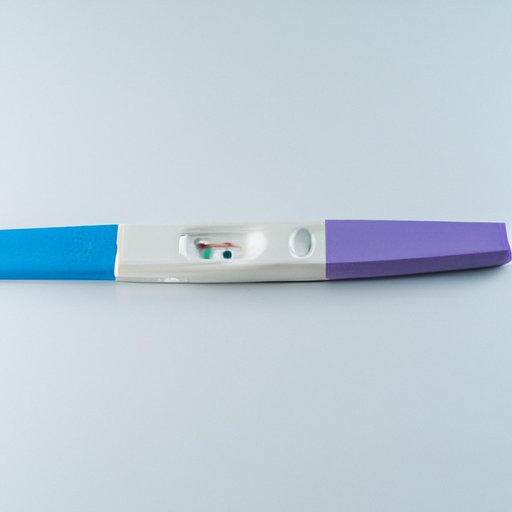Introduction
Implantation is a crucial step in the process of pregnancy and can determine when a pregnancy test will be accurate. Knowing when to take a pregnancy test after implantation can be crucial for those trying to conceive, especially for those experiencing fertility issues or undergoing assisted reproductive treatments. This article aims to provide a comprehensive guide to pregnancy testing after implantation, covering everything from the biology of implantation to the accuracy of at-home pregnancy tests.
Understanding the Process: A Beginner’s Guide to Implantation and Pregnancy Testing
Implantation is the process by which a fertilized egg attaches itself to the lining of the uterus. This typically occurs around 6-10 days after ovulation and can cause slight discomfort or spotting in some women. Pregnancy tests work by detecting the presence of human chorionic gonadotropin (hCG), a hormone produced by the placenta after implantation. Understanding these concepts can help ensure that accurate results are obtained during testing.
Timing is Everything: The Best Time to Take a Pregnancy Test After Implantation
The timing of a pregnancy test after implantation depends on various factors, such as the length of a woman’s menstrual cycle and the date of ovulation. Most at-home pregnancy tests claim to detect hCG levels in urine as early as 6-10 days after ovulation, but it is recommended to wait until after a missed period for the most accurate results. Additionally, some tests are more sensitive than others and may be able to accurately detect pregnancy earlier than others.
Early Detection: How to Know if You’re Pregnant Before a Missed Period
While waiting for a missed period may provide the most accurate results, there are symptoms and methods that can indicate pregnancy before a period is due. These include early pregnancy symptoms such as fatigue, nausea, and breast tenderness, as well as early response pregnancy tests and blood tests. It is important to note that these methods may not be as accurate as waiting for a missed period and false negatives can still occur.
At-Home Testing: Tips for Accurate Pregnancy Testing After Implantation
At-home pregnancy tests are a convenient and private way to test for pregnancy. Different types of tests have varying levels of accuracy and sensitivity, and it is important to read the instructions carefully and follow them exactly to achieve accurate results. Common mistakes to avoid include testing too early, using expired tests, or misinterpreting ambiguous results.
False Negatives and False Positives: What You Need to Know About Pregnancy Testing After Implantation
False negatives and false positives can occur when testing for pregnancy, and it is important to be aware of the factors that can influence these results. Testing too soon after implantation, using diluted urine, or using a test that has expired can all increase the likelihood of false results. It is also possible to receive a false positive due to certain medications or medical conditions, and a confirmatory test with a healthcare provider is recommended if there is any doubt about the result.
Waiting it Out: Patience and Persistence in Pregnancy Testing After Implantation
Waiting for the right time to test and persisting in testing until a clear result is obtained can be emotionally challenging but important for accurate results. It is essential to stay positive and seek support from loved ones and healthcare professionals during this process. Online forums and pregnancy testing calculators can provide additional resources and support.
Conclusion
In conclusion, knowing when to take a pregnancy test after implantation can help provide accurate results and ease the stress of waiting for pregnancy confirmation. Understanding the biology of implantation and the various methods of testing can provide a comprehensive approach to this process. Patience, persistence, and seeking support can make this challenging time easier for those trying to conceive.
(Note: Is this article not meeting your expectations? Do you have knowledge or insights to share? Unlock new opportunities and expand your reach by joining our authors team. Click Registration to join us and share your expertise with our readers.)
